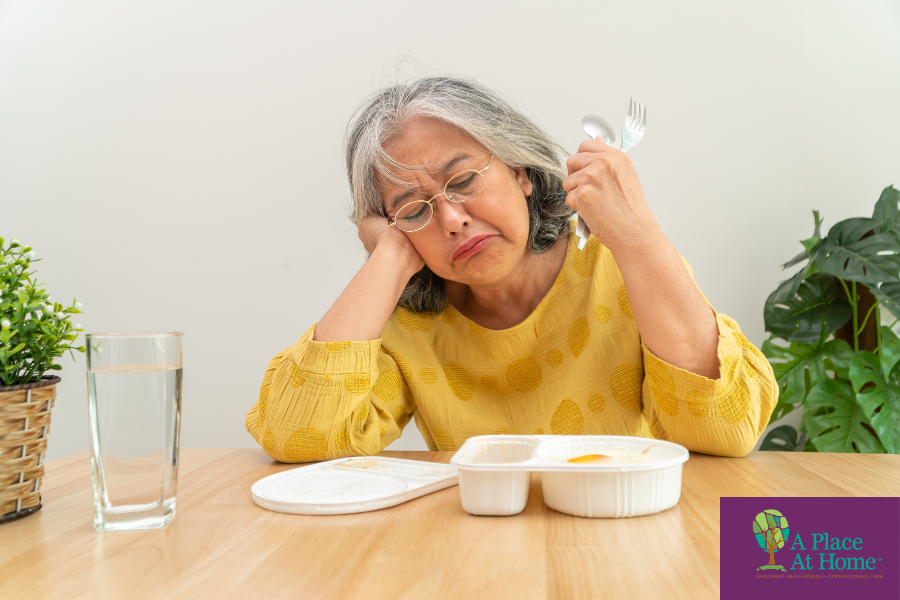It’s common for older adults to experience a loss of appetite, which can make maintaining proper nutrition challenging. Physiological changes, lifestyle factors, and certain medical conditions often reduce their desire to eat. Proper nutrition is essential for seniors, as balanced meals and adequate fluids help maintain strength, energy, and overall health.
A poor appetite in seniors can have serious consequences. According to the National Institute of Health (NIH), up to 15–30% of older adults experience significant appetite loss, which can lead to malnutrition and increased hospitalization risk. It often leads to unintentional weight loss, fatigue, and malnutrition, which can impair both physical and cognitive function. These issues increase the risk of falls, weaken the immune system, and raise the likelihood of hospitalization, highlighting the importance of early intervention and support. In this guide, we explain how caregivers and family members can help increase appetite in seniors and support their well-being.
Why Seniors Lose Their Appetite
As individuals grow older, a combination of physical, emotional, and medical factors can reduce their desire to eat. Changes in taste and smell, along with a slower metabolism and lower activity levels, can make meals less appealing. Emotional challenges, including loneliness, depression, or social isolation, may further decrease interest in food. Additionally, dental issues, chronic health conditions, and certain medications can make eating uncomfortable or difficult. By recognizing these factors, caregivers and family members can develop targeted strategies to help seniors maintain proper nutrition and a healthy appetite.
Medical Causes
- Chronic illnesses: Conditions such as dementia, Parkinson’s disease, cancer, diabetes, and depression can affect hunger and food enjoyment.
- Medications: Certain prescriptions may alter taste, cause nausea, or reduce appetite.
Lifestyle and Physiological Causes
- Changes in metabolism and activity: Seniors often burn fewer calories due to slower metabolism and reduced physical activity.
- Dental and oral health issues: Missing teeth, gum disease, or poorly fitting dentures can make chewing difficult.
- Sensory changes: A diminished sense of taste or smell may make food seem bland.
Emotional and Social Causes
- Isolation or loneliness: Seniors who eat alone may skip meals.
- Stress or grief: Emotional challenges can reduce interest in eating.
Studies show that over 40% of adults over age 65 experience changes in taste or smell, contributing to reduced food enjoyment. Additionally, nearly 30% of older adults report medication side effects such as nausea or altered taste that discourage regular eating. Recognizing these factors is the first step toward addressing appetite loss. While a gradual decrease in appetite can be a normal part of aging, a sudden loss of appetite should be taken seriously. Caregivers should encourage the senior to see a doctor, as underlying medical conditions, such as cancer, dementia, or hypothyroidism, may be the cause and require prompt treatment.
Read More: What Are the Most Common Causes of Dizziness in Seniors?
Signs a Senior May Be Struggling with Appetite
Caregivers should be alert to early warning signs that a senior’s appetite may be declining. These can include unexplained weight loss or sudden changes in body composition, eating smaller or fewer meals than usual, difficulty chewing or swallowing food due to dental or health issues, and a loss of interest in meals, particularly during social dining occasions.
A reduced appetite can lead to malnutrition, fatigue, and weakness, impacting both physical and cognitive health. Seniors who skip meals or withdraw from social eating may experience further declines in nutrition and overall well-being. Recognizing these signs early allows caregivers and family members to intervene with targeted strategies, helping to improve appetite, maintain energy levels, and support overall quality of life.

Practical Tips to Increase Appetite in the Elderly
Helping older adults maintain a healthy appetite requires a combination of dietary, social, and lifestyle strategies. Caregivers can encourage eating by:
- Offering smaller, more frequent meals throughout the day to prevent overwhelming portions.
- Making meals visually appealing with colorful fruits and vegetables can stimulate interest in food.
- Enhancing flavor naturally using herbs, spices, or mild seasonings, especially if taste perception has declined.
- Establishing a consistent mealtime routine so seniors know when to expect meals, which can help regulate hunger cues.
- Incorporating social interactions during meals, such as family dinners or caregiver companionship, to make eating a more enjoyable experience.
- Providing variety in textures and foods to engage the senses and prevent mealtime boredom.
By implementing these strategies, caregivers and family members can support seniors in eating more regularly, improving nutrition, and maintaining energy levels and overall well-being.
Foods That Help Seniors Eat More and Stay Nourished
Ensuring seniors get the nutrients they need can be challenging when their appetite is low. Choosing foods that are both appealing and easy to eat can make a big difference.
| Food | Benefit | How to Serve |
|---|---|---|
| Avocado | High-calorie, nutrient-dense | Mash, add to smoothies, or spread on toast |
| Nut butters | Protein and healthy fats | Spread on bread or mix into oatmeal |
| Yogurt | Soft, easy-to-chew protein | Add fruit or honey |
| Fish | Omega-3s and protein | Bake or steam for softness |
| Soups & broths | Hydration and nutrients | Include vegetables, beans, or shredded meat |
| Comfort foods | Familiar and easy to digest | Serve mashed potatoes, oatmeal, or stews |
How Caregivers and Families Can Support Better Eating Habits
Caregivers and family members can take several steps to help seniors maintain a healthy appetite and proper nutrition:
- Encourage frequent, nutrient-rich snacks: Offer easy-to-eat options like carrot sticks, nuts, raisins, or other finger foods to boost calorie and nutrient intake.
- Serve bite-sized foods for easier eating: For seniors who have difficulty using utensils, try cheese cubes, cocktail sausages, or peanut butter on toast.
- Offer drinkable meals: Smoothies and shakes are excellent alternatives to solid foods, delivering essential vitamins, minerals, and protein.
- Make mealtimes social and enjoyable: Join the seniors during meals to create a pleasant atmosphere that encourages eating.
- Incorporate light exercise: Short walks, gentle stretching, or other physical activity can help stimulate appetite and support overall health.
By combining these strategies, caregivers and family members can help seniors eat more consistently, meet their nutritional needs, and maintain energy, strength, and quality of life.
When Loss of Appetite in the Elderly Becomes a Serious Concern
A persistent loss of appetite in older adults can lead to serious health complications, including malnutrition, fatigue, and a weakened immune system. The Alliance for Aging Research reports that malnutrition contributes to approximately $51 billion in annual U.S. healthcare costs related to older adult hospitalizations and long-term care.
Caregivers should be aware of specific risks, such as:
- Vitamin and mineral deficiencies: Low vitamin D can weaken bones.
- Protein deficiency: Insufficient protein intake can lead to muscle loss and general weakness.
- Underlying health conditions: Sudden or prolonged appetite loss may indicate illnesses such as cancer, dementia, or hypothyroidism.
Seniors experiencing ongoing loss of appetite, especially when accompanied by weight loss, fatigue, or other symptoms, should consult a physician. Early medical intervention helps identify underlying issues and ensures appropriate treatment or dietary adjustments, supporting better overall health and quality of life.
Get Professional Home Care Support Today

For families with busy schedules, professional elderly home care ensures seniors receive nutritious meals and avoid the health risks of decreased appetite. A Place At Home – North Tucson provides compassionate, non-medical support tailored to each senior’s needs.
Caregivers shop for fresh groceries and prepare healthy meals, serving smaller, more frequent portions and offering hydrating beverages throughout the day. Companionship is key—caregivers join seniors at mealtimes, engage in hobbies, hold conversations, and play games, supporting both appetite and emotional well-being.
Flexible care options include occasional respite, specialized Alzheimer’s care, post-surgical support, and live-in or 24-hour care. Serving North Tucson, AZ, and the nearby areas in Pima County, A Place At Home delivers personalized in-home care to help seniors maintain nutrition, energy, and quality of life. Schedule a free in-home consultation to create a tailored care plan today.
Frequently Asked Questions (FAQs)
How do you treat elderly appetite loss?
Elderly appetite loss is treated by addressing underlying medical issues, improving meal appeal, and establishing regular eating routines. Caregivers can offer smaller, nutrient-rich meals, social mealtimes, and light exercise to stimulate hunger. Medical evaluation is important if appetite loss is sudden or severe.
How to feed an elderly who doesn't want to eat?
If an elderly person doesn’t want to eat, offer small, easy-to-chew meals, nutrient-dense snacks, and flavorful foods to make eating more appealing. Incorporate social meals, smoothies, or shakes, and encourage gentle activity to naturally boost appetite.
What can an elderly person do to gain weight?
Seniors can gain weight by eating small, frequent, calorie- and protein-rich meals, including healthy fats like avocado and nut butters. Drinkable meals such as smoothies, fortified shakes, and soups can also help increase caloric intake without overwhelming the appetite.
What is the main cause for eating less in old age?
The main causes of eating less in old age include changes in taste and smell, slower metabolism, dental problems, chronic health conditions, medications, and emotional factors such as loneliness or depression. These factors can reduce hunger and make meals less appealing.

